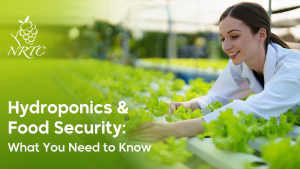
As the global population grows and climate challenges intensify, so does the demand for sustainable, efficient, and resilient farming methods. One solution gaining significant momentum is hydroponics—a method of growing plants without soil, using nutrient-rich water solutions to nourish crops directly.
What is Hydroponics?
Unlike traditional farming, hydroponics eliminates soil and instead uses carefully balanced mineral solutions to provide plants with the nutrients they need. Crops are grown in controlled environments such as greenhouses or vertical farms, allowing precise management of water, light, and nutrients.
This method not only maximizes crop yield but also ensures consistent quality, regardless of external weather conditions.
Why Hydroponics is Important for Food Security
- Efficient Water Usage Hydroponic systems use up to 90% less water compared to traditional farming—an essential advantage for regions like the UAE where water scarcity is a pressing concern.
- Year-Round Production With controlled environments, hydroponics enables uninterrupted food production, ensuring fresh fruits and vegetables are available throughout the year.
- Higher Yields in Less Space Vertical farming and hydroponic setups can produce more food per square meter than conventional fields, making them ideal for urban areas with limited land availability.
- Reduced Reliance on Imports By growing locally in controlled systems, hydroponics reduces dependence on global supply chains, strengthening the UAE’s journey towards food security and self-sufficiency.
- Better Quality & Freshness Crops grown hydroponically often have enhanced nutritional value, taste, and shelf life—directly benefiting consumers and businesses alike.
Hydroponics and the UAE’s Food Future
At NRTC Fresh, we recognize the importance of adopting innovative agricultural practices to meet the UAE’s growing demand for fresh produce. Hydroponics represents a forward-thinking approach that not only supports sustainability but also aligns with the country’s vision for a secure and resilient food system.
We recognize the importance of adopting these farming methods as a secure and resilient approach for the future, and we support such technologies. This ensures that future generations can continue to enjoy healthy, fresh, and high-quality produce—grown closer to home.

